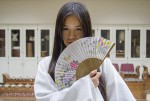A woman stands in a dark room with nothing but a chair.
The scene is the most memorable for Yiran Wang, a first-year business economics student who plays the role of Jin Xiu. She is the star of the Chinese Fantasy Theatre Group’s spring production, “Phantom of the Kun Opera,” which premieres on Friday at 7 p.m. in Schoenberg Hall.
Wang said this scene sums up her character’s traits – Xiu is a woman who carries the weight of the family on her shoulders. She desires emotional support from her master and is distraught when she finds herself alone.
“Phantom of the Kun Opera” will be performed in Mandarin with English subtitles on screens in the theater. Director Qianqian Chen, a graduate student in molecular, cellular and integrative physiology, said the play incorporates the cross-cultural themes of heartbreak, betrayal and family honor, so both Chinese and American audiences can enjoy it.
“Phantom of the Kun Opera” tells the story of the Wu family, which has tried to preserve the legacy of the Chinese Kun opera through several generations. Master Wu, the most prestigious Kun opera performer in China, faces many challenges after a Chinese revolution when all three of his sons are unable to follow in his footsteps.
His only hope is his female disciple Xiu, who becomes torn when she falls in love with Wu’s second son. Xiu, who later has a son of her own, is expected to pass down the tradition of Kun opera.
“Phantom of the Kun Opera” was revised by Chen, who is also president of the Chinese Fantasy Theatre Group. Chen said the piece is told as a narrative through the eyes of Master Wu’s third son.
Chen said she chose to revise this piece to incorporate themes that are significant today, such as family loyalty.
“The Kun opera is something really traditional. Even the young students these days do not know how it works,” Chen said. “We tried to bring this culture to younger Chinese audiences.”
In traditional Kun opera, men acted as women on stage, Chen said. After the revolution, men playing female roles became a rarity.
In April, Chen had the opportunity to meet with Mou Yuandi, one of only a few men who still perform as female characters, called “nandan,” in Chinese opera. After interviewing Yuandi, Chen said she was able to better understand the significance of Kun opera and the importance and difficulty of maintaining the tradition.
“(Yuandi) suffered from people’s
prejudice as he pursued his career,” Chen said.
During the revolution, Kun opera was forbidden. Shortly after, people tried to revive Kun opera – this period of time, right after the revolution in 1938, is where “Phantom of the Kun Opera” begins.
Chen said she created the Chinese Fantasy Theatre Group in February 2012 after missing the unique style of Chinese theater when she arrived in the United States.
“I tried to go to the theater here to take classes, but (the classes I took were) different from what I did before … because of cultural differences,” Chen said. “I wanted to give the Chinese students here an opportunity to (perform plays in Mandarin).”
Chen said she chose the group’s shortened name, CFan Theatre Group, as a commemoration of her theater group in China. “CFan” is a literal translation from the Mandarin character meaning “Love the mundane world.” The group’s name is an embodiment of its goal to depict universal themes that all cultures can identify with.
Yijing Lin, a second-year computational mathematics student and publicity manager for “Phantom of the Kun Opera,” said she auditioned for a role in the group’s production of Agatha Christie’s novel “And Then There Were None”in February 2013.
“I love American theater, but I feel more like home when acting in (Mandarin),” Lin said.
The Chinese Fantasy Theatre Group puts on a production every fall and spring quarter, and offers workshops in the fall. Chen said anyone with an interest in theater can join the group, which performs pieces influenced by, but not limited to, Chinese culture.
Auditions for “Phantom of the Kun Opera” went on three months prior to the show, and were open to both members and non-members. While most of the cast were members of the Chinese Fantasy Theatre Group at the time of auditions, many were recruited after auditions, Lin said.
“Talent and commitment are what we care (about) the most,” Lin said.
Chen and Wang said that after attending the long practices, they are glad to see the production finally coming together.
“You need to squeeze in time for rehearsals. … It’s tiring, and sometimes you feel pressured,” Wang said. “You remember what it was like when all of you were here to practice, to rehearse and to work towards a common goal.”
Chen said she hopes that the audience, both Chinese and American, can take away the same message from the play – that while preserving tradition is important, it should never be at the expense of family relationships.
“(The play is) a tragedy. … I want to show that we should value the people more than cultural art,” Chen said. “It’s really easy for art to survive, but it’s not that easy for people, for (family) to survive.”

wow gorgeous!